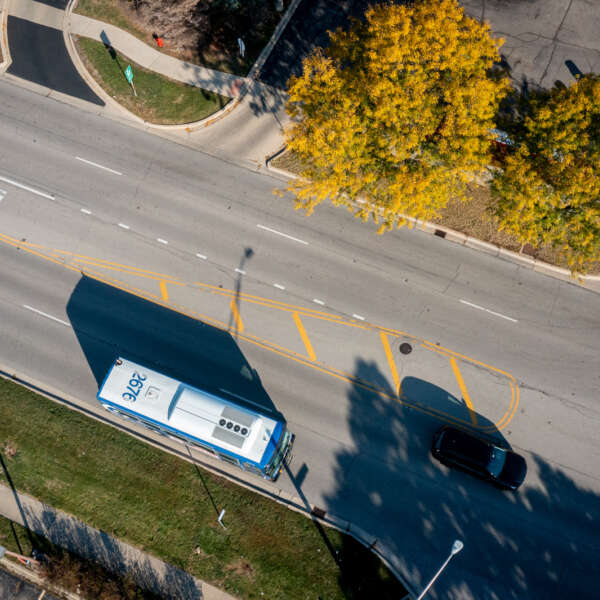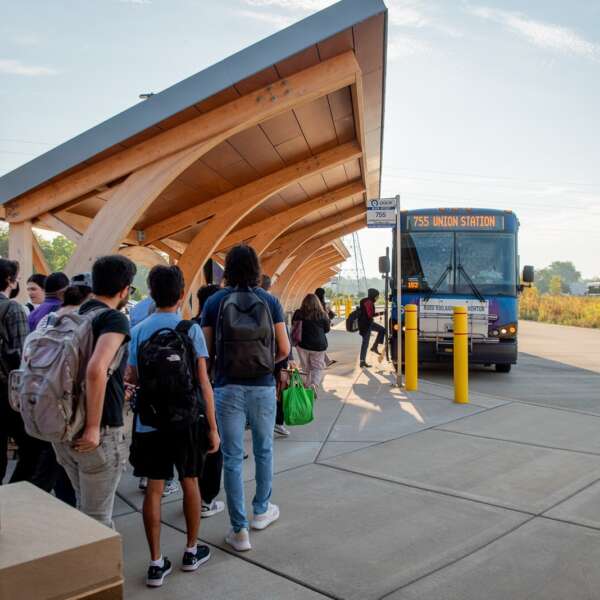Read recaps and watch recordings of the RTA's four-part Transportation Tuesday webinar series
June 25, 2024
June 25, 2024

The RTA brought back Transportation Tuesday, its popular four-part webinar series each Tuesday May 28–June 18 from noon to 1:30 p.m. The free, virtual sessions allow attendees to hear from experts, ask questions, and learn about hot topics in transportation planning as they relate to implementation of the RTA’s regional transit strategic plan, Transit is the Answer. The Transportation Tuesday series includes regional and national leaders, along with RTA staff leading discussions about the opportunities, challenges, and resources available to the Chicago region.
Participation is free, but registration is required. Read below for descriptions and links to recaps of each of the four webinars.
With last year’s adoption of Transit is the Answer came 15 new evaluation metrics that comprise a strategy for evaluating and selecting capital projects. Now, the RTA, CTA, Metra, and Pace are working together to improve and expand the system in a way that promotes transparency and advances equity, sustainability, and accessibility across the transit system and region. RTA staff will discuss the agency’s new evaluation criteria, and presenters from the CTA, Metra, and Pace will each highlight a project or initiative that advances equity, sustainability, or accessibility. A demonstration will also be given on the capital projects portion of RTAMS, the RTA’s mapping and statistics website. Read a recap and watch a recording.
Mary Weber (moderator) is Senior Analyst, Capital Programming, at the RTA. Mary previously worked for the Chicago Metropolitan Agency for Planning (CMAP) on projects such as completing a forecast analysis cycle to improve the Transportation Improvement Program.
Jon Sung is a Senior Analyst, Capital Programs, at the RTA. He previously served as a project manager for the RTA's Sign Maintenance program and worked on the Interagency Signage program.
Chris Szmurlo is a Principal Analyst, Data Services and Analytics, at the RTA, where he has worked for the past eight years. His duties range from managing the RTAMS website to various mapping efforts.
Clare McGuire is a Senior Project Manager, Red Line Extension Controls, at the Chicago Transit Authority (CTA). Clare has lived in Chicago since 2015 and is originally from Omaha, Nebraska. Clare previously served as the school budget manager for Chicago Public Schools and as the budget and operations manager for the University of Chicago Inclusive Econmy Lab.
Roberto Torres is Chief Mechanical Officer at Pace Suburban Bus. Previously, he served as the City of Chicago's Manager of Vehicle Maintenance, the CTA's Manager of Bus Maintenance, and an Air Monitoring Technician for Cook County.
Dustin Clark is Manager of Program Development and Grant Pursuits at Metra. He previously worked as a Planner for the City of Highland Park and then Project Coordinator for Lightengale Group, an affordable housing real estate financial advisory firm that offered services to developers.
Parking dominates the United States, in both land area and policy debates. In 2013, the Chicago Metropolitan Agency for Planning (CMAP) estimated that the Chicago region had over 3.2 million commercial and industrial off-street parking spaces, equal to almost 23 square miles. This supply of parking spaces is largely the result of parking mandates—local land use regulations that require a certain number of parking spaces for new developments. Parking mandates have in turn exerted tremendous influence on land use and transportation patterns. Learn about the impact of parking mandates on transit-oriented development (TOD), how they exacerbate issues related to housing supply, and how they contribute to higher costs for new development. With speakers representing municipalities and planning agencies in the Chicago region and Minneapolis, this webinar will explore how reforming parking mandates can reduce costs for new development, enable more people to live in walkable neighborhoods, and foster vibrant communities. Read a recap and watch a recording.
Alex Waltz (moderator) is a Principal Planner at the RTA working in the Local Planning and Program Management division. He manages projects funded through the RTA’s Community Planning and Access to Transit programs and is passionate about enhancing the built environment that surrounds transit stops and stations.
Juan Sebastian Arias is the Executive Director of Elevated Chicago, a multi-disciplinary collaborative comprised of residents, community organizations, artists, developers, community development financial institutions, activists, and city officials/policymakers. Elevated works with the City of Chicago on implementation of the City’s Equitable Transit-Oriented Development (ETOD) Plan and provides capital and technical assistance for new developments near transit that are community-led and that fight displacement. Prior to becoming Executive Director, Juan Sebastian helped develop Chicago’s ETOD Plan and the City’s Connected Communities Ordinance and served as First Deputy of Policy at the Mayor’s Office.
Lindsay Bayley is the Program Lead for Safe and Complete Streets at the Chicago Metropolitan Agency for Planning, where she focuses primarily on equitable transportation and safety. She has also managed a variety of community planning projects, local active transportation plans, and parking management studies. In addition to her work at CMAP, Lindsay is co-founder of the Parking Reform Network, a public benefit non-profit organization with the goal of educating the public about parking policy and assisting others with parking reform.
Liz Williams is the Planning Manager at the City of Evanston and has experience in transportation planning at the municipal and regional level in communities throughout the United States. As Planning Manager, she directs departmental activities related to both comprehensive long-range planning and current planning review of development proposals. Evanston is currently in the process of developing a new comprehensive plan and amending its zoning ordinance. The City reduced off-street parking requirements for developments within 1/8 mile of a rail station in 2017.
Jason Wittenberg, AICP, is the Code Development Manager for the City of Minneapolis, where he has worked for the Community Planning & Economic Development Department since 1998. Jason has experience managing zoning code reforms that eliminated exclusive single-family zoning regulations and minimum parking mandates.
CTA and Pace are two of the largest bus operators in North America, but the Chicago region is significantly lacking in dedicated lanes and space for transit on our roadways. Learn about how transit agencies in peer regions plan and implement transit friendly street designs and bus rapid transit in both new and existing corridors, how they navigate jurisdictional challenges and opposition, and lessons our region might learn from their work. Read a recap and watch a recording.
Peter Kersten (moderator) is Program Manager, Strategic Plan Implementation, for the RTA. He played a critical role in development of the RTA’s Transit is the Answer regional transit strategic plan and manages that plan’s implementation. He is a member of the 2024 class of the American Public Transportation Association (APTA) Emerging Leaders Program.
Frank Alarcon is Manager, Bus Rapid Transit (BRT) Projects at Metro Transit in Minneapolis/St. Paul. In this role, Frank is responsible for delivery of several of the Twin Cities’ arterial BRT projects, including the METRO B Line, currently under construction, and the METRO F Line, currently in design. His duties include defining project delivery strategies, managing project scopes and budgets, leading procurements, and negotiating agreements. Prior to joining Metro Transit, Frank worked as a transportation planner for five years for Ramsey County in Saint Paul. Frank holds a Bachelor of Arts in Political Science from the University of Chicago and a Master of Urban and Regional Planning from the University of Minnesota, and previously served as a Peace Corps Volunteer in rural El Salvador.
Nadine Chalmers is a Manager, Service Planning at Niagara Frontier Transportation Authority (NFTA). Nadine is responsible for the management of long- and short-term bus and rail planning, scheduling, data collection and analytics, community engagement, and business and partner development. Her involvement in current key projects include the development of the Niagara-region’s first Bus Rapid Transit line, planning for an extension of the current LRT line, and a shelter expansion and bus stop balancing program. Nadine oversees the NFTA Metro Citizen’s Advisory Committee and is leading a study aimed at upgrading and improving NFTA's paratransit services.
Michael Rhodes is the Transit Priority Manager at the San Francisco Municipal Transportation Agency (SFMTA). He leads a matrix team of planners, engineers, and outreach staff to deliver transit reliability improvements in San Francisco. Prior to joining the SFMTA in 2015, he worked for Nelson\Nygaard on a variety of transit, parking management, and transportation demand management (TDM) projects.
The staying power of remote and hybrid work post-COVID has triggered operating funding crises for America’s largest public transit systems. With Chicago’s regional transit system facing a projected $730 million annual operating shortfall starting in 2026, opportunity exists to learn from peer regions and states that had to act sooner to shore up their financial futures. Hear from leaders from across the country who worked on major transit funding legislation post-COVID. Read a recap and watch a recording.
Chris Van Eyken (moderator) is the Director, Research & Policy, for TransitCenter. His work focuses on encouraging transit agencies to adopt best practices and needed reforms. Chris has advocated for better transit as an agency staff member and as an external advocate. He has provided technical support to agencies in the US and abroad.
Miguel Moravec is a senior associate with the Rocky Mountain Institute’s US Program, which implements effective climate solutions at the federal, state, and local levels. Through the America Is All In coalition, Miguel collaborates with US institutions and businesses to achieve emissions reductions across multiple sectors of society. As a science professional, Miguel worked for US Environmental Protection Agency’s Safer Chemicals Research Group and has additional experience at Princeton’s National Oceanic and Atmospheric Administration lab and Columbia’s Science, Technology, Engineering And Math Student Experiences Aboard Ships (STEMSEAS) Program.
Subscribe to our Newsletter
Related Articles
 Coalition members provide feedback on ‘Transforming Transit,’ RTA’s vision for improved service and accountability
Coalition members provide feedback on ‘Transforming Transit,’ RTA’s vision for improved service and accountability
Nearly 200 riders, advocates, and other stakeholders met virtually with the RTA on February 11 for the sixth quarterly Transit is the Answer Coalition meetin...
February 20, 2025 Far South Halsted Corridor Study prepares for future Pace Pulse service
Far South Halsted Corridor Study prepares for future Pace Pulse service
An RTA Community Planning project kicked off in late 2023 as a crucial step in bringing Pace Pulse service to Chicago’s south suburbs. The Far South Halsted ...
February 19, 2025 RTA proposes reforms to prioritize capital projects, maximizing impact of funding
RTA proposes reforms to prioritize capital projects, maximizing impact of funding
RTA is proposing a historic restructuring of the region’s transit governance to maximize the impact of new operating funding and ensure all riders experience...
February 5, 2025 RTA proposes reforms to integrate fares, require accountability for faster and more reliable transit
RTA proposes reforms to integrate fares, require accountability for faster and more reliable transit
RTA is proposing a historic restructuring of the region’s transit governance to maximize the impact of any new operating funding and ensure all riders experi...
February 5, 2025 For the third year in a row, regional transit ridership was up by double-digits in 2024
For the third year in a row, regional transit ridership was up by double-digits in 2024
Ridership across the Chicago region’s transit system continued to increase throughout 2024, according to the latest data from CTA, Metra, and Pace. The regio...
January 28, 2025 RTA is seeking $1.5 billion in annual operating funding. What would that mean for your commute?
RTA is seeking $1.5 billion in annual operating funding. What would that mean for your commute?
On January 15, RTA released Transforming Transit, a vision for the regional transit system with $1.5 billion in annual operating funding supported by a stron...
January 28, 2025